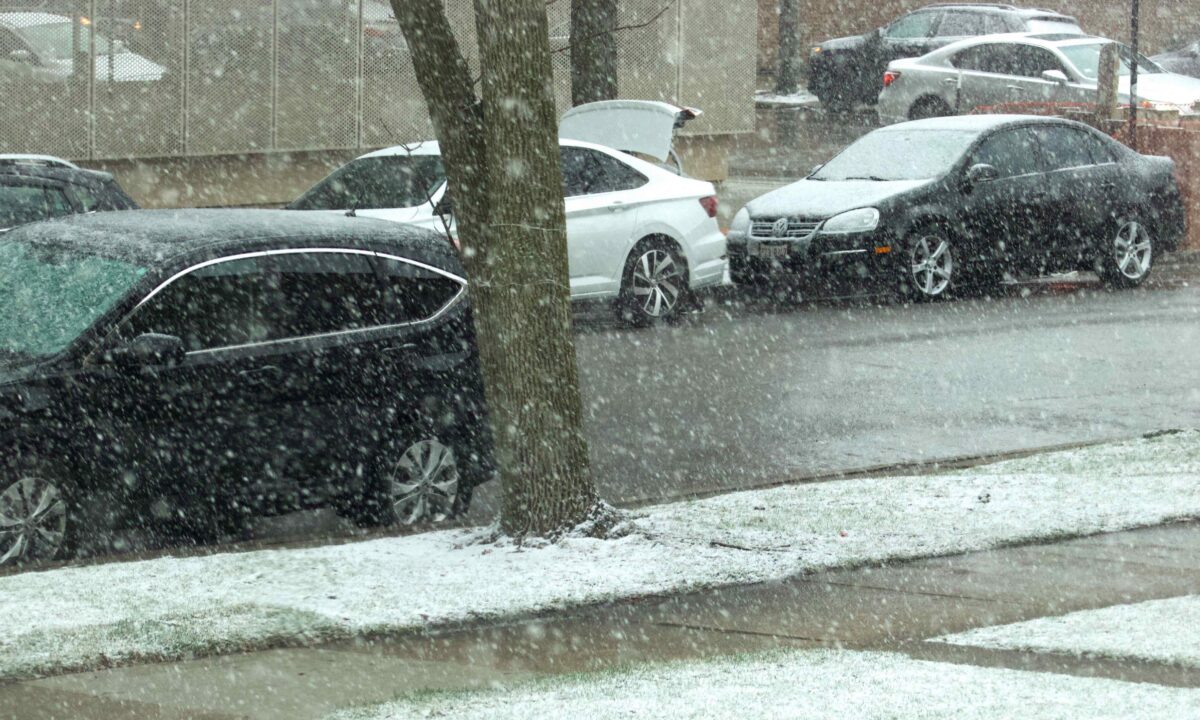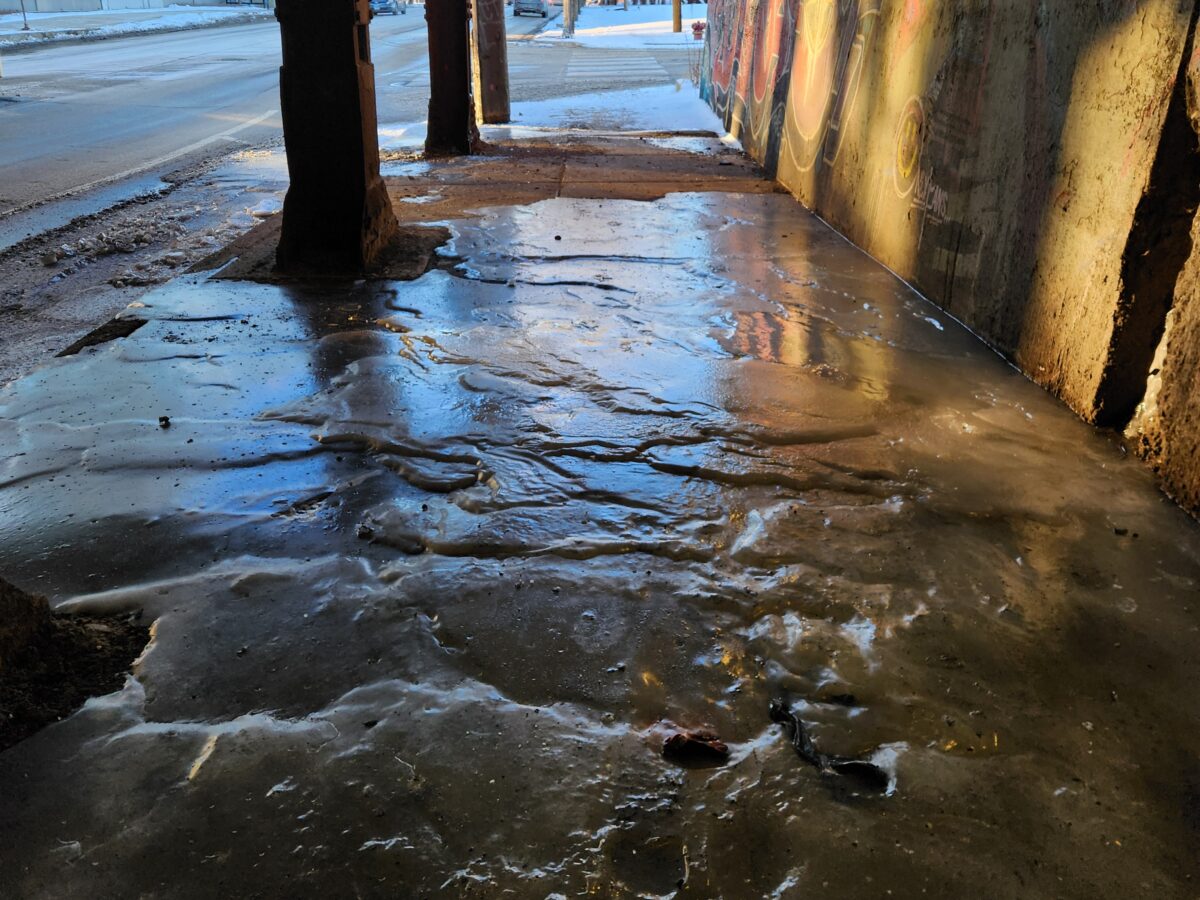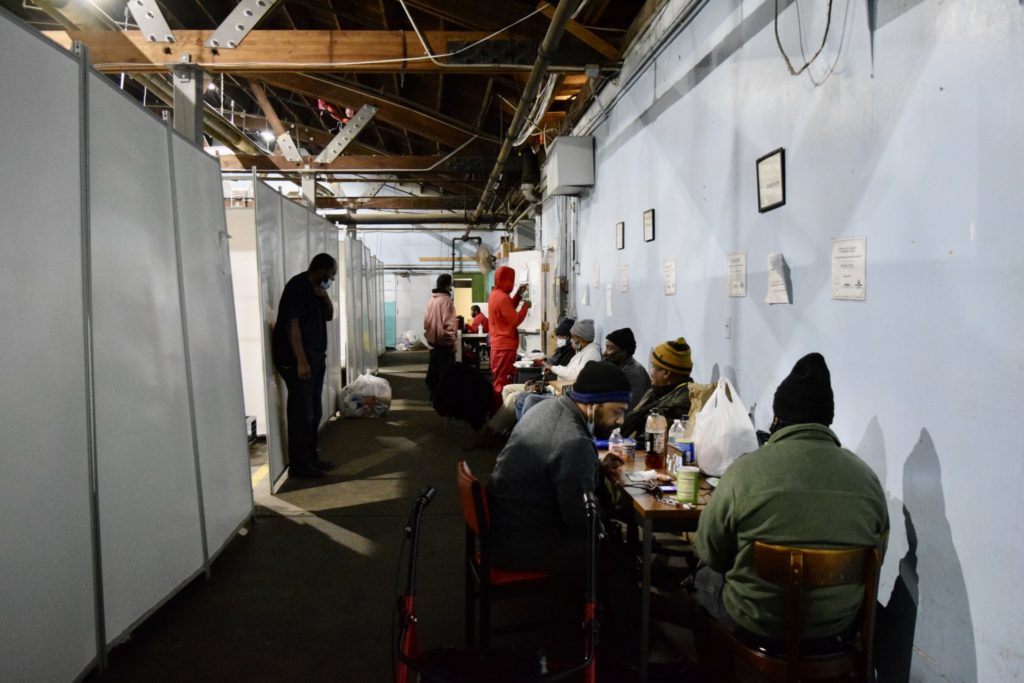Chicago is not afraid of winter. In the worst-case scenario, a blizzard sweeps across the Great Lakes, blanketing the city with snow. The Department of Streets & Sanitation (DSS) will deploy a fleet of more than 300 plows to carve through 9,400 miles of roadway: first the main arterials, and then the quieter residential streets. As required by the municipal code, Chicago property owners must take charge of clearing their own sidewalks, shoveling paths in front of their homes and rental properties, hiring help, or soliciting assistance from ad-hoc or coordinated volunteer efforts.
The result is usually passable enough that businesses stay open, most residents can reach their bus stops, and children can walk from their drop-off points to schools. But the effort is far from comprehensive, and even a single patch of ice can block seniors, people with disabilities, and parents with strollers from reaching essential destinations like grocery stores and child care facilities. Even those who are fully mobile sometimes sustain injuries from slipping on ice.
Getting everyone to shovel their own sidewalks remains an elusive goal. The city promotes peer vigilance, encouraging residents to report uncleared snow through 311 service requests. The Department of Transportation (CDOT) responds to these 311 complaints, issuing citations when property owners fail to clear daytime snow by 10pm or overnight snow by 10am. After a fifteen-hour grace period, property owners are subject to fines between $50 to $500 per day.
According to data obtained by South Side Weekly from the Department of Administrative Hearings, the city issued more than 1,900 uncleared-sidewalk citations over four winters from July 2019 to June 2023. The Chicago Department of Transportation (CDOT) issued nearly three-quarters of these citations, with DSS accounting for most of the remainder. In rare instances, police and the Department of Business Affairs and Consumer Protection also issued citations.
But the data also show that enforcement of fines varies wildly across departments and from ward to ward. This variation suggests a lack of coordination between grassroots volunteer mobilization and neighborhood vigilance, top-down citywide efforts from DSS and CDOT, as well as aldermanic prerogative in directing ward services.
Between 2019 and 2023, the city issued more citations in Greater Englewood’s 15th Ward than any other, with 161 of its 171 citations issued by DSS. In Lincoln Park’s 43rd Ward, the second-most ticketed ward, CDOT issued 101 of 103 total citations. Citywide, the median number of citations per ward is only 21.5.
Each ward faces different challenges, dependent on factors such as the prevalence of arterial roads and vacant buildings, as well as levels of trust in the city’s 311 system. Likewise, no two alders are the same, and each takes a unique approach to influencing enforcement.
CDOT, the primary city department ticketing for sidewalk snow clearance, reacts in part directly to residents who file 311 complaints. Property owners are typically warned first and then issued a citation if they’re not responsive.
But data show that the rate of CDOT citations relative to complaints is not at all consistent across the city. On average CDOT issues one citation per fifteen complaints. But the agency issues one citation per three complaints in Alderperson Silvana Tabares’ 23rd Ward near Midway airport, and one citation per roughly five complaints in the 3rd, 37th, 11th, and 13th wards.
Individual property owners may sometimes face the burden of a seemingly arbitrary and inconsistent enforcement system. But city data shows some large corporations and retail chains are frequent offenders.
CDOT issued citations to ComEd at six different properties across the city. The department likewise fined four Family Dollar stores and two Dollar Tree stores, while DSS cited a third Dollar Tree.
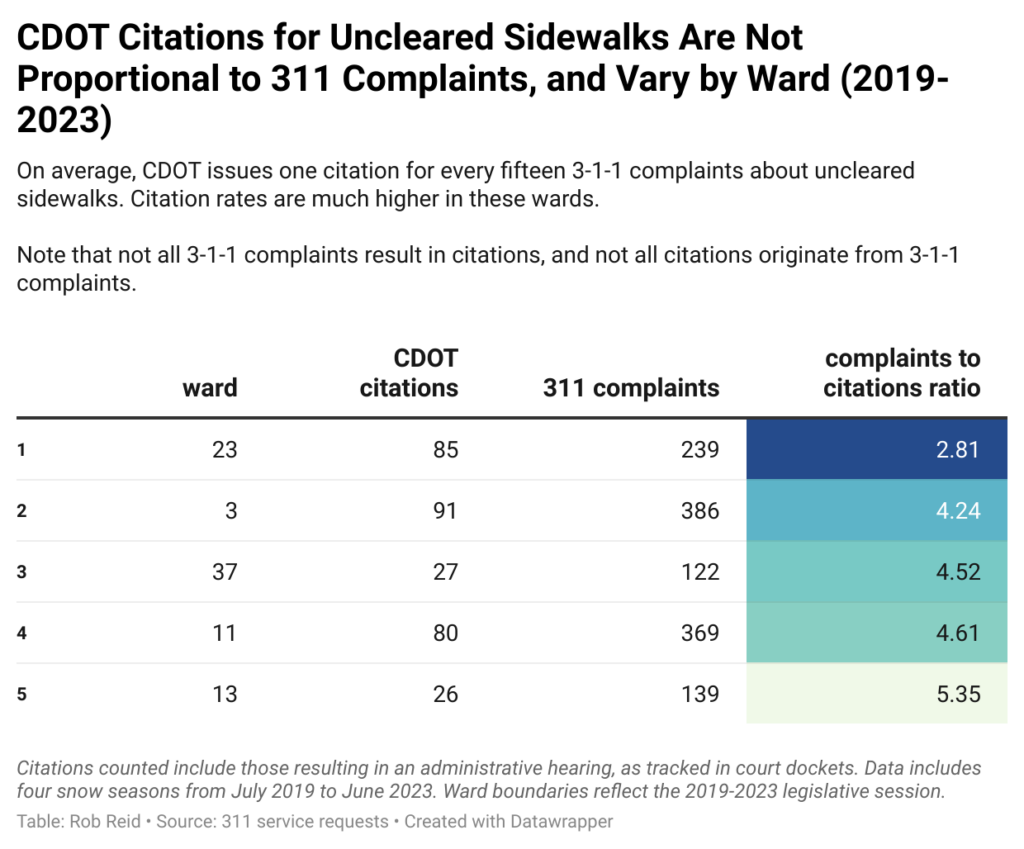
Nobody likes paying fines, of course. In January, Block Club published a guide to avoiding snow clearance fines, reminding readers that fines for uncleared sidewalks can run from $50 to $500 per day. The piece also encouraged residents to contact 311 to report neighbors who don’t shovel.
Such grassroots vigilance may be intended to complement CDOT’s proactive top-down efforts.
“CDOT public way inspectors respond to 311 service requests from the public and aldermen regarding uncleared sidewalks,” said Erica Schroeder, a CDOT spokesperson. “Inspectors also proactively check sidewalks throughout the city following snow and ice events. Inspectors will often opt to issue a warning instead of an immediate fine for first-time violators. The goal is not to issue citations, but to ensure compliance so that people can get around safely.”
Schroeder did not respond to a question about why Garfield Ridge, which includes the 23rd Ward, has a higher rate of fines per complaint than anywhere else in the city.
Citywide, DSS issues uncleared sidewalk citations far less frequently than CDOT. But those citations are highly concentrated in a small number of wards, with the top three wards: 15th, 16th, and 6th, all in Greater Englewood. Two far North Side wards, the 40th and 49th, also issued a significant number of citations, but they were a fraction of those issued in Englewood.
Alderpersons are responsible for managing routine constituent services such as filling potholes and trimming trees. Their perceived competence at fulfilling such services plays a considerable role in their electability.
While each ward faces different challenges to comprehensive snow clearance, alderpersons have considerable latitude in how they tackle it. Each ward has its own ward superintendent, who works closely with alderpersons and monitors “sanitation services that include refuse collection, street cleaning, and snow removal for an assigned ward.”
Cat Sharp, chief of staff for alderperson Andre Vasquez, said that the 40th Ward takes snow clearance seriously, particularly as an accessibility issue. The ward office addresses this need in part by organizing a volunteer shovel squad. But she also said they work with their DSS ward superintendent to ticket businesses and large apartment buildings, particularly on major thoroughfares, as part of a stopgap solution. Administrative Hearings data confirms that amongst twenty-seven citations issued through DSS, all but two targeted properties on major thoroughfares.
The 40th Ward ranks fifth in citations issued by DSS for snow clearance. That’s less than a third of the number of DSS citations issued in the 16th Ward and about one-sixth of the number of citations issued in the 15th Ward.
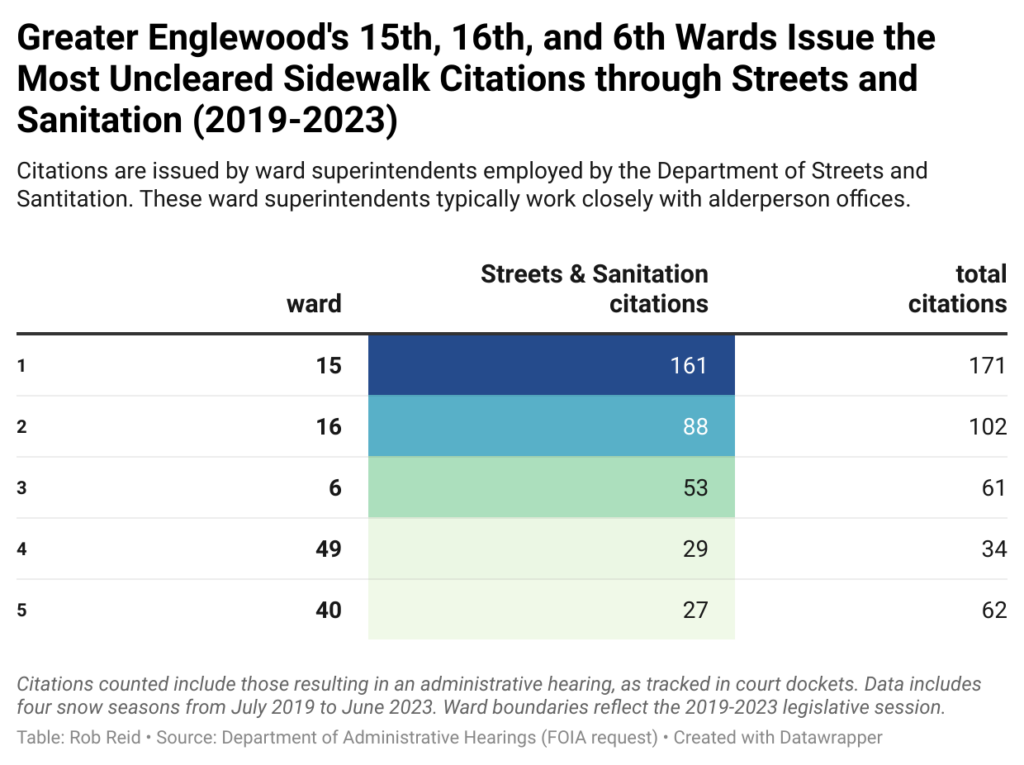
16th Ward alderperson Stephanie Coleman did not respond to an email and a call requesting insight into why her ward issues so many citations and leans heavily on DSS. Ray Lopez, alderperson for the neighboring 15th Ward, offered some explanations as to why his ward has so many citations compared to others.
“We have a lot of vacant property that we cannot address unless a ticket is issued,” Lopez said. “And this relates not just to snow, but any city service that’s required to be brought to a particular location.”
Acknowledging that the fines alone may not directly solve the problem, Lopez said he hopes to get these properties “resurrected so that they are functional and a positive force on the tax rolls as opposed to a drain on our departments’ resources.”
Such vacant properties are prevalent across wide swaths of the South and West sides. But they’re not at all unique to Greater Englewood.
“I don’t believe that leniency is something that’s deserved in these circumstances, because it’s something that we’ve explained ad nauseam, something that we have educated our residents to report, and we expect people to comply for the good of the community,” Lopez said.
He acknowledged that the city doesn’t have an official contact list of property managers. This suggests that his ward office’s educational efforts may not reach everyone. He also conceded that property owners are often unclear on expectations, particularly when ward boundaries change over time. “It shouldn’t matter that one side of the street enforces snow removal and the other side does not,” he said.
As Lopez readily conceded, the fines don’t immediately address the problem of clearing sidewalks, given that court hearings can take several months to adjudicate fines.
Inspector General Deborah Witzburg said fines can change behavior but added that the relationship is “hard to demonstrate.” To the extent that the city does use a fines-based approach to enforcement, “We have basic responsibilities to do that in an accurate and equitable way,” she said, adding that “keeping clear records” is critical.
DSS Director of Public Affairs Mimi Simon, like Schroeder at CDOT, did not respond to a question about disparities between enforcement in different wards. She stated only that the department addressed complaints from community residents and ward offices.
Witzburg attributed some of the disparities to differences in context.
“Different neighborhoods do in fact have different needs, different priorities, different challenges,” she said. But she added that she’s seen “problems of consistency across wards” in other contexts that she’s studied. As a general principle, Witzburg advocates a balance between consistency and local control.
“The ideal here should be consistency where it matters, in terms of access to, and equity in, the provision of city services,” she said. “But not consistency for consistency’s sake. Where there are unique needs and unique challenges in neighborhoods we should be addressing those.”
Police occasionally issue tickets for uncleared sidewalks. They’ve only done so twenty-five times over the four-year period. But those tickets are concentrated in West Englewood and Englewood, which account for ten of those twenty-five citations.
One police officer issued tickets to two churches in West Englewood in 2021, and a third in East Englewood in 2022. West Englewood’s Capernaum and New Mount Calvary Missionary Baptist churches were both found liable for $50 fines, while East Englewood’s ticket was dismissed for lack of evidence.
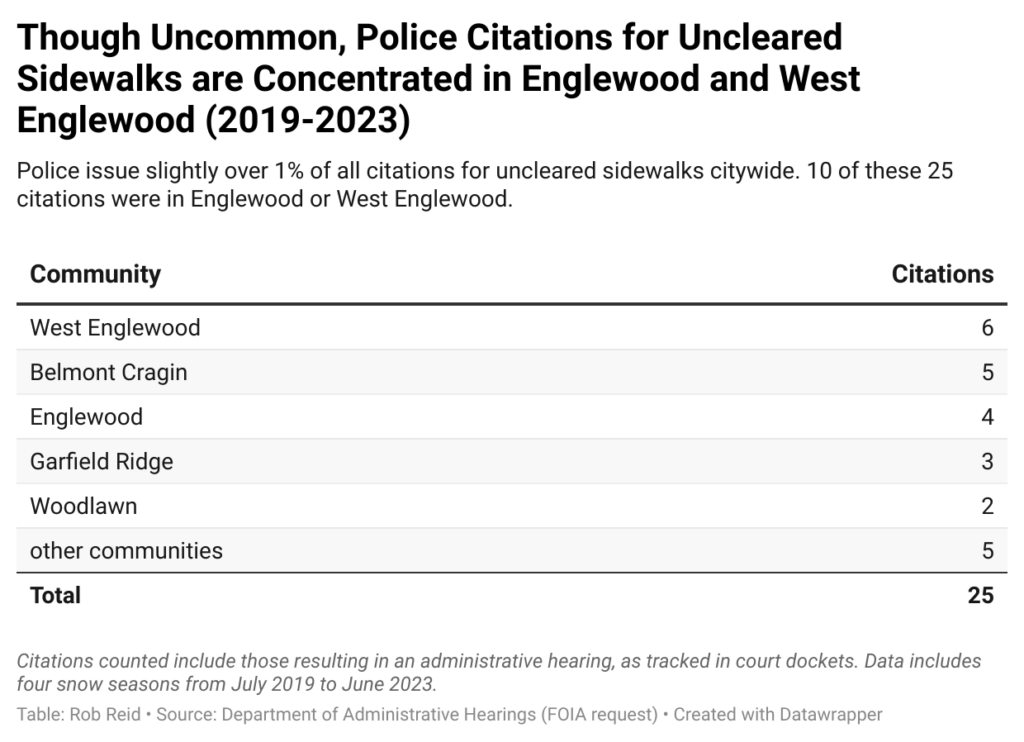
Despite fines issued by CDOT, DSS, and police, uncleared sidewalks remain. During a mild winter, the city’s 311 line received 1,227 complaints related to uncleared sidewalks since January.
Alderperson Lopez said he doesn’t see the high level of citations in his ward as a problem. Instead, he pins blame for persistent snow clearance problems on inconsistent enforcement.
“The problem that we see isn’t the fact that we are enforcing the law [in the 15th ward],” he said. “I think the problem is that forty-nine other people have their own versions of enforcement.”
Lopez said he’d like to see better coordination between city departments. Specifically, he’d like the Department of Buildings and DSS to maintain a registry of building owners, which Lopez and other alders could use as contact lists. Specific to vacant properties, he expressed concern that the Department of Buildings, the Law Department, and Police Department “like to work in silos” in a way that “works against the community’s desire to see these vacant properties either rehabbed, demolished, or maintained and secured.”
DSS spokesperson Simon pointed out correctly that CDOT is the primary agency enforcing snow clearance. CDOT’s Schroeder did not address a question about how (if at all) those two agencies coordinate their efforts.
In March 2023, the Inspector General published an advisory citing eleven examples of coordination issues between city departments. Witzburg noted that the city is required by its own municipal code to hire an administrative officer to “lead interdepartmental coordination in city government.” But, she said that role “has gone unfilled for decades.”
In a response attached to that advisory, then-Mayor Lightfoot’s chief of staff dismissed the IG’s suggestion as “an archaic and overly simplistic approach to City management.”
As an alternative to the fines-based approach, the Plow the Sidewalks working group is expected to provide their recommendations to Chicago’s Committee on Pedestrian Traffic and Safety by the end of May. The committee will then decide whether to advance a funded pilot program which could grant a reprieve on fining properties within these pilot zones. This would raise new expectations for a coordinated effort across selected pilot zones.
Witzburg said she anticipates there’ll never be enough resources to “shovel every foot of sidewalk in the city,” but hopes that the inevitable budget-motivated prioritization decisions “should be aligned with clear assessment of need across Chicago’s communities.”
Hinting at the limitations of the 40th Ward’s reliance on levying fines via DSS, Cat Sharp said the 40th Ward office sees the Plow the Sidewalks pilot as a stepping stone towards “expanding the City snow shoveling pilot to ensure clear sidewalks in our ward as a long-term solution.”
Rob Reid is a freelance local journalist specializing in data wrangling, map-based storytelling, and community history.

